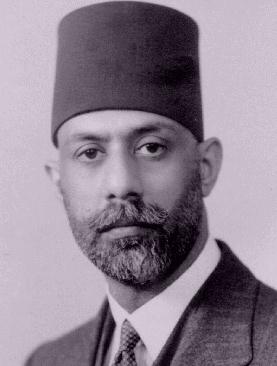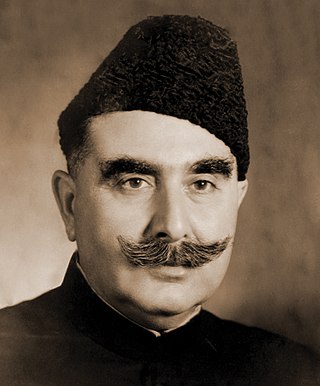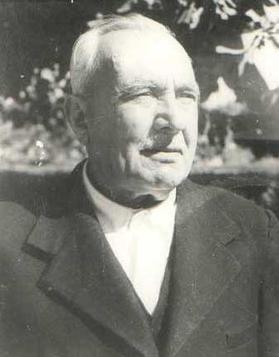Related Research Articles

Liaquat Ali Khan was a Pakistani lawyer, politician and statesman who served as the first prime minister of Pakistan from 1947 until his assassination in 1951. He was as pivotal to the consolidation of Pakistan as the Quaid-i-Azam, Muhammad Ali Jinnah, was central to the creation of Pakistan. He was one of the leading figures of the Pakistan Movement and is revered as Quaid-e-Millat and later on as "Shaheed e Millat".

Sir Khawaja Nazimuddin was a Pakistani politician and statesman who served as the second governor-general of Pakistan from 1948 to 1951, and later as the second prime minister of Pakistan from 1951 to 1953.

Dawn is a Pakistani English-language newspaper that was launched in British India by Muhammad Ali Jinnah in 1941. It is the largest English newspaper in Pakistan, and is widely considered the country's newspaper of record. Dawn is the flagship publication of the Dawn Media Group, which also owns local radio station CityFM89 as well as the marketing and media magazine Aurora.

Choudhry Rahmat Ali was a Pakistani nationalist who was one of the earliest proponents of the creation of the state of Pakistan. He is credited with creating the name "Pakistan" for a separate Muslim homeland in British India and is generally known as the originator of the Pakistan Movement.

The Lahore Resolution, also called the Pakistan Resolution, was a formal political statement adopted by the All-India Muslim League on the occasion of its three-day general session in Lahore, Punjab, from 22 to 24 March 1940, calling for a separate homeland for the Muslims of British India.

Sir Malik Khizar Hayat TiwanaKCSI, OBE was a British Indian statesman, landowner, army officer, and politician belonging to the Punjab Unionist Party. He served as the prime minister of the Punjab Province of British India between 1942 and 1947. He opposed the Partition of India and the ideology of Muslim League. He was eventually ousted from office by the Muslim League through a civil disobedience campaign, plunging Punjab into communal violence that led to the partition of the province between India and Pakistan.

From a historical perspective, Professor Ishtiaq Ahmed of the University of Stockholm and Professor Shamsul Islam of the University of Delhi classified the Muslims of Colonial India into two categories during the era of the Indian independence movement: nationalist Muslims and Muslim nationalists. The All India Azad Muslim Conference represented nationalist Muslims, while the All-India Muslim League represented the Muslim nationalists. One such popular debate was the Madani–Iqbal debate.

Sardar Abdur Rab Nishtar was a Pakistani independence activist and politician from the North-West Frontier Province. He served as the first Minister of Communications of Pakistan from August 1947 to August 1949 and then as the second Governor of West Punjab from August 1949 to November 1951.

Khan Abdul Jabbar Khan, popularly known as Dr. Khan Sahib, was a pioneer in the Indian Independence Movement and later, a Pakistani politician. He was the elder brother of the Pashtun activist Abdul Ghaffar Khan, both of whom opposed the partition of India. Upon independence, he pledged his allegiance to Pakistan and later served as the First Chief Minister of West Pakistan.

Muhamad Yusuf Khan Khattak was a Pakistani politician, left-wing intellectual, lawyer, and noted Pakistan Movement activist from Khyber Pakhtunkhwa.
Altaf Husain was an educationist, journalist, and Pakistan Movement activist. He is noted as one of the pioneers of print journalism in Pakistan and was the founding editor and the first editor-in-chief of English-language newspaper, Dawn, which he edited for almost twenty years.
The Star was an English-language evening newspaper in Pakistan that ceased publication in 2005.

Amin ul-Hasanat, better known as the Pir of Manki Sharif qv, was the son of Pir Abdul Rauf and an Islamic religious leader in the North-West Frontier Province (NWFP) of British India. After joining the All-India Muslim League in 1945, he was noted for his campaign in the provincial referendum held in early part of 1947, that saw the NWFP become part of Pakistan rather than India. He was popularly known as ''Fateh-e-Referendum''.
Muhammad Yusuf Abdullah Haroon was a Pakistani businessman and politician who served as the 5th Governor of West Pakistan and 3rd Chief Minister of Sindh.

Majlis-e Ahrar-e Islam, also known as Ahrar for short, is a religious Muslim political party in the Indian subcontinent that was formed during the British Raj on 29 December 1929 at Lahore.

The Jinnah family was a political family of Pakistan. It has played an important role in the Pakistan Movement for creation of Pakistan, a separate country for Muslims of India. The family held the leadership of All-India Muslim League, and its successor, Muslim League, until it was dissolved in 1958 by martial law.

Khan Jalaluddin Khan, aka Jalal Baba, was a Muslim League stalwart and a Pakistan Movement activist who served as the 8th Interior Minister of Pakistan under the Premiership of Feroz Khan Noon. Jalal Baba was a major figure in British Indian and later Pakistani politics, in particular in the North-West Frontier Province.

Muhammad Ali Jinnah was a barrister, politician, and the founder of Pakistan. Jinnah served as the leader of the All-India Muslim League from 1913 until the inception of Pakistan on 14 August 1947 and then as the Republic of Pakistan's first governor-general until his death.

Opposition to the Partition of India was widespread in British India in the 20th century and it continues to remain a talking point in South Asian politics. Those who opposed it often adhered to the doctrine of composite nationalism in the Indian subcontinent. The Hindu, Christian, Anglo-Indian, Parsi and Sikh communities were largely opposed to the Partition of India, as were many Muslims.
References
- ↑ Jinnah, Mahomed Ali (1943). The All-India Muslim league, Karachi session, December, 1943. Presidential address by ... M.A. Jinnah. Delhi: Latifi Press. OCLC 26406992.
- ↑ Jinnah, Mahomed Ali (1976). Plain Mr. Jinnah. Vol. 1. Royal Book co. p. 236. Retrieved 10 October 2012.
- ↑ Inani, Rohit. "The forgotten Delhi home of a historic Pakistani newspaper". The Caravan. Retrieved 2019-09-23.
- ↑ "Setting up the Muslim mouthpiece | ePaper | DAWN.COM". epaper.dawn.com. Retrieved 2019-09-23.
- ↑ Govind Sahai (1956). A critical analysis of Rashtriya Swayamsevak Sangh. Naya Hindustan Press. p. 49.
- ↑ "Poetry". Pennsylvania: Arabic Department University of Pennsylvania. Retrieved 10 October 2012.
- ↑ R. B. S (1944). "Reviewed work: Biruni's Picture of the World, A. Zeki Validi Togan". The Geographical Journal. 103 (6). JSTOR: 284–285. doi:10.2307/1789622. JSTOR 1789622.
- ↑ "Catalogue". catalogue.bl.uk.